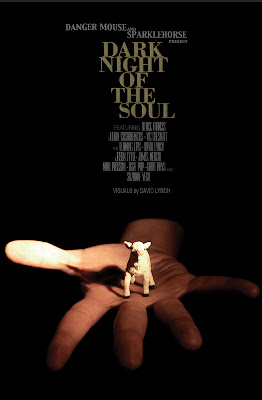
Mentioned in bits and pieces for years, and from seeds planted as early as 2005, Dangermouse and Sparklehorse Present: Dark Night of the Soul is a wide-reaching collaboration a long time coming. Tracks crafted as early as four years ago by Dangermouse (Brian Burton) and Sparklehorse (Mark Linkous) were sent out to a slew of high profile collaborators who lent their talents, most of them appearing on several songs playing various instruments, popping up for background vocals, and aiding in production. Just a few of these names are Grandaddy's Jason Lytle, The Pixies' Frank Black, and Iggy Pop. Dangermouse, keeping up with his controlled mating of the film and music realms, includes among DNotS' laundry list of guests some guy named David Lynch (he directs movies or something?), who contributed a 100-page book of photography as a visual companion to the LP. Oh and he also wrote lyrics and sings on no less than two tracks, including the dusty, eponymous closing track. The album's completion in 2008 was followed by hazy disputes between Dangermouse and label EMI that delayed and even threatened it's release. In 2009 a hardcover, limited edition of David Lynch's photography book quickly sold out. With the music still under wraps legally, but in fact already floating around the internet, the book included a printed, but blank and recordable cd-r with a note to "use it as you will". Sadly, guest artist Vic Chestnutt passed away in December '09, followed by the suicide of Mark Linkous in May '10. July 12th saw the official release of the audio portion of Dangermouse and Sparklehorse Present: Dark Night of the Soul.
Merging Burton's cinematic production with Linkous' melancholy tone, DNotS is a detailed affair, skirting genres from grimy bar tunes to fragile pop, and generally playing in movements pulling you from one scene to another. Starting with the plodding, mournful tone of "Revenge" featuring The Flaming Lips and the pastoral twang meets bass stomp of "Just War" with Gruff Rhys, the being now known and SparkleMouse ventures far from these beginnings, planting firmly in the surf guitar jam of "Little Girl" before dropping into a slow, growling fuzz for "Angel's Harp" with Frank Black. Iggy Pop closes out the first half of DNotS with "Pain", his baritone thick among one of the more sonically raw tracks to be found here.
Computer blips and synth-tweaked vocals over a heavy pulsing bass brings us to the blissed-out "Star Eyes (I Can't Catch It)", the first sign of Lynch for everyone except the 5000 owners of the DNotS photobook, then Jason Lytle brings the grime back with "Everytime I'm With You", asking "What the hell else are we supposed to do?" in a nihilistic love-hate song about getting fucked up repeatedly. In an album wild with Dangermouse's production flourishes, "Insane Lullaby" is particularly interesting, with James Mercer's voice hovering over a bed of instruments that are largely obscured by a boiling 16th note pummel of distorted drums. Nina Persson of the Cardigans and Suzanne Vega lend the album it's most upbeat tone yet with their respective tracks, "Daddy's Gone" and "The Man Who Played God", before turning on it's heel to the morbid "Grim Augury", with Vic Chesnutt's vividly dark imagery both disturbing and engaging the listener. David Lynch shows up again for the closing track "Dark Night of the Soul", pulling the curtains on the album with an echo-drenched disappearing scrawl.
While Dark Night of the Soul has it's weak moments, even for them it's a beautiful assembly of an ambitious project, pulling together different art forms into a multi-sensory landscape, with a general clarity of vision that's surprising, given the broad range of talent involved. If this is the modern equivalent of the supergroup album, I'm in.
4 / 5











